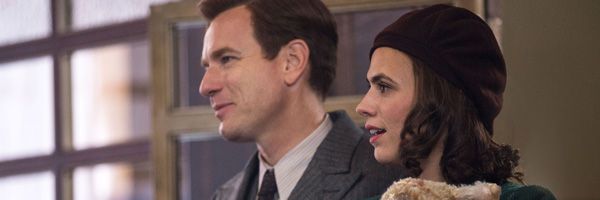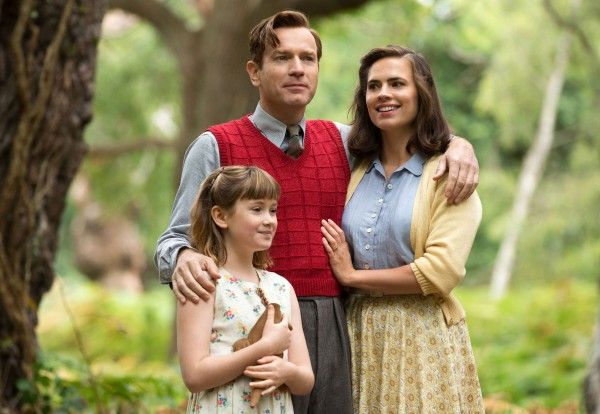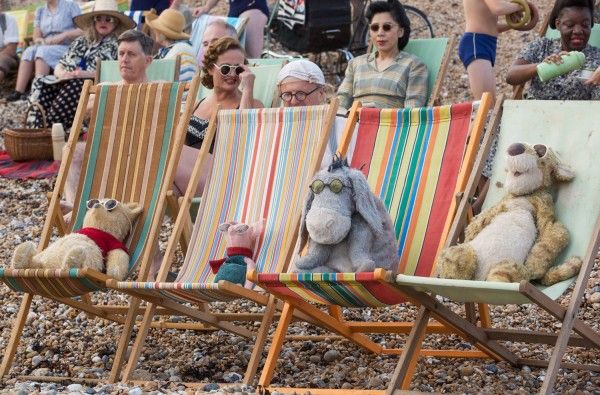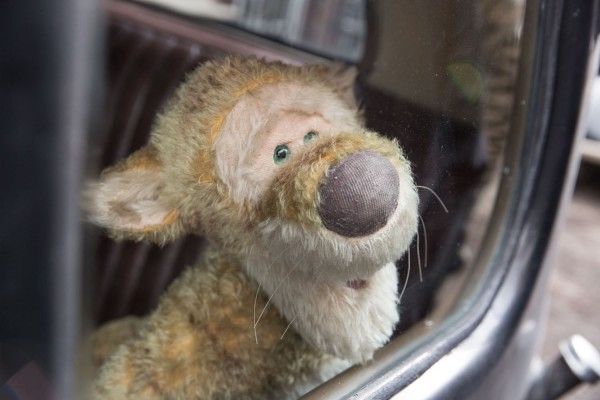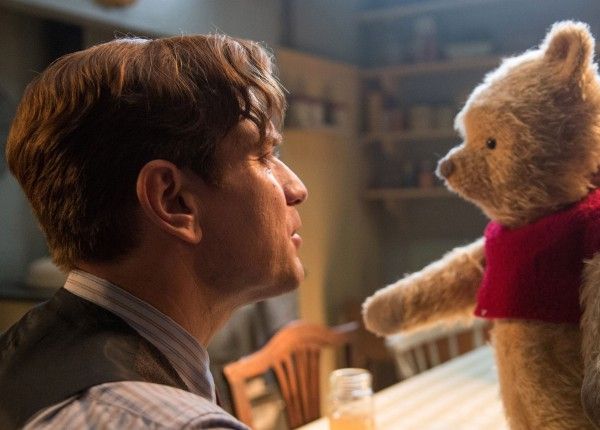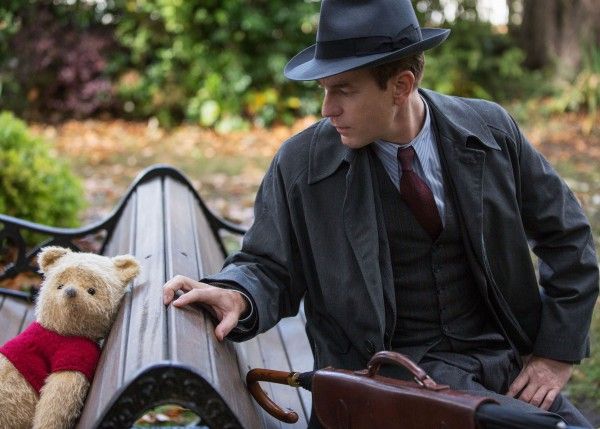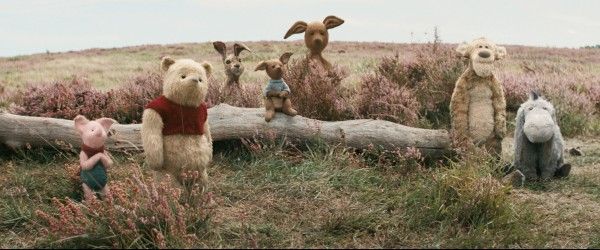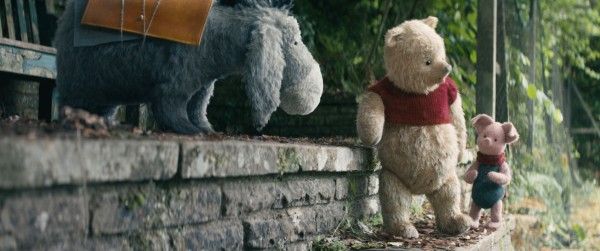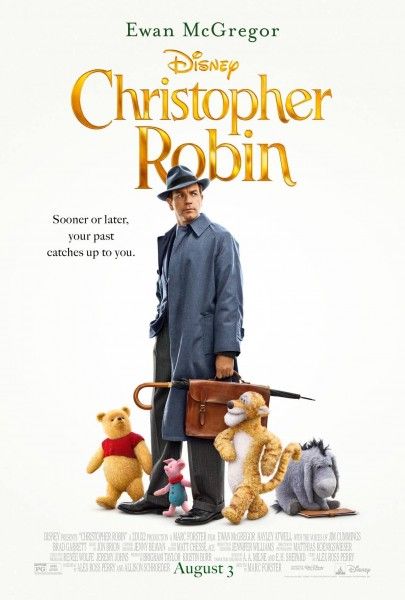Disney's Christopher Robin shows what life is like now for the young boy who grew up and left behind the stuffed animal friends he shared countless adventures with in the Hundred Acre Wood. As an efficiency manager at Winslow Luggage, Christopher Robin (Ewan McGregor) spends more hours in the office than with his own family (Hayley Atwell, Bronte Carmichael), who are growing tired of his broken promises, prompting Winnie the Pooh (voiced by Jim Cummings), Eeyore (voiced by Brad Garrett), Piglet (voiced by Nick Mohammed) and Tigger (also voiced by Cummings) to leave the Hundred Acre Wood for the first time, on a mission to remind their old friend of the endless days of wonder and make-believe that defined his childhood.
At the film’s Los Angeles press day, Collider (along with a handle of other outlets) was invited to participate in a roundtable interview with co-stars Ewan McGregor and Hayley Atwell, who talked about the magic of Winnie the Pooh, why they had no trepidation about taking on roles in such a well-loved story, acting opposite characters who aren’t really there, what they got to take home with them from the set, and making the effort to take more time to connect with loved ones.
Question: What is the magic of Winnie the Pooh, for both of you?
HAYLEY ATWELL: It’s all very quintessentially English. My aunt still has a Kanga on her bookshelf. There’s an idealism of this quaint world of the Hundred Acre Wood and these little animals. There’s an innocence that we all relate to because it’s this childhood innocence of spending long summer days with your best friends, just hanging out and not doing anything. The appeal is that sense of gentleness and safety in that world of friendship, when you’re a child and you don’t have any of the burdens of responsibility, or before big things happen to you, and where you can create your reality very much within your own imagination, in your back garden. That’s the universal appeal, I think.
EWAN McGREGOR: I couldn’t have put it any better than that. That was great! In terms of just what appealed to me, (director) Marc [Forster] approached me. I’d worked with Marc on a film that we made, called Stay, which was this weird and wonderful movie with Ryan Gosling and Naomi Watts. And I’ve always bumped into Marc and stayed somewhat in touch with him, over the years. We’d spoken about some other projects, in the meantime, that hadn’t worked out, for one reason or another, and when he spoke to me about this, I loved the way he talked about it. I loved the way he described it. It didn’t sound to me like a Disney remake. The way he talked about it, it just sounded like what you see in the movie. There’s an artfulness to it. There’s almost a darkness to it, which is surprising.
ATWELL: Yeah, which you see in some of Marc’s other work. That was an appeal to me, as well. It felt that it was a very individual filmmaker, coming in and taking a story that is obviously under the umbrella of this huge institution of Disney, who’s been telling Pooh’s story for all of these years. Having someone like Marc come in, who’s a very individual filmmaker, himself, and has a very distinct look and has done lots of different kind of movies, was really interesting to me. He’s very creative, and that was an appeal.
Was there any trepidation for either of you, coming into the roles from such a well-loved story?
McGREGOR: Not at all. Nobody knows what Christopher Robin is like, as a 47-year-old man, except me. I’ve done that before, in plays and stuff, where you play a character who’s been played many times before, and that’s quite scary. We know Christopher Robin, as a small seven-year-old from A. A. Milne’s books and from Disney’s animations, but we don’t know who he is, as an adult.
ATWELL: It was the opposite of trepidation. I felt trusting. I get to be part of a world that is already known and loved. It’s like preaching to the choir, in a way. You just go in and understand the tone of it, and you do what is required in that world. I felt in very safe hands. Jim Cummings is doing the voice and the characterization of Pooh is absolutely there. They’re not gonna do anything bizarre with it. It is what it is. So, I felt a lot more relaxed, really.
What’s it like to act opposite these characters who aren’t really there?
McGREGOR: Well, I have lots of experience with that from the old “Galaxy Far, Far Away” days. What Marc did beautifully was cast each character. There was a real actor for every character. He mainly cast young actors who’d just come out of drama school, and they were so enthusiastic and talented. They would play the first takes with us, many times actually in the shot, just holding the teddy bear. There was a real version of each character. I’ve also got a Pooh of my own. I got a Pooh out the back door.
ATWELL: Bronte [Carmichael], who played Madeline, got Piglet. I got a gramophone.
McGREGOR: Marc got all of them, but Disney charged him for them. I secretly got my own Pooh. There was a real version of each one, and we got to play the first takes with that. There was an actor, called David, who played Pooh, and he would hold the bear and move him. If we were walking, he had him on this little harness with a pole, and he would be able to walk him along with me, but so slowly. I would say to David, “Can we just get him moving?” And he said, “No.” He’d been taught exactly how long it would take Pooh to make a step, so it was so slow, but it became real. We’d do the first takes with the real bear, or Tigger, or Eeyore, or whatever, and then they would step the actors out, sometimes leaving the bear there, if it was just static in the scene, and if not you just had to pretend you were looking at him. There were also various other ones. There was a gray one, and one with no head. There was one that was just a body. There was one with Pooh’s torso and no head, legs, or arms, which was the horror version.
Were you a little bummed out that you didn’t get to have a musical moment with the characters?
McGREGOR: We got to have a little dance.
ATWELL: We sung a lot in the car.
McGREGOR: We were not un-musical, in our way, just not on screen.
ATWELL: Thankfully!
Ewan, how did you get into the mode of playing Christopher Robin as an adult who regains his sense of childlike wonder?
McGREGOR: It was very much in the writing. That was his story. Pooh helps him to find this child in him again, who he was when we first see him, at the beginning of the movie. Life happens to him and he’s lost that, and Pooh helps him back to that. I suppose it was quite hard, in some of the earlier scenes with Hayley and Bronte, to hold back.
ATWELL: As an actor, I find it quite hard, if you have to play not aware of the situation when you would be very aware of it, or you would be sensitive enough to know. I would want to step , but you have to hold back and pretend you don’t know.
McGREGOR: At that point, he doesn’t know. Those scenes were the hardest ones to play, but they’re very important to tell the story.
ATWELL: You also don’t want to come across as mean-spirited, instead of just not understanding.
McGREGOR: Those scenes with us in the house, at the beginning, set that up beautifully, I think. When he comes back home and he’s going to the thing at work, you can see her frustration, but you can see that there’s love and that they love each other. It’s very important that we understand that, or else you won’t root for them.
ATWELL: Exactly! You want them to come back. If you see them, in the beginning, with the dancing and their love together, and this beautiful connection. Then, you know what’s at stake for him, if he loses it or can’t find his way back to that. What a missed opportunity to have this wonderful life with this woman who loves him and this beautiful daughter that wants to just be with him. That’s all that they want. The misunderstanding of the man trying to provide and the woman just going, “What are you trying to aspire to get? Your life is here now. You’re missing what your life actually is, by trying to attain something when you’ve already got it.” It’s a very sweet part of the film.
One of the themes of this film is about how busy we get, and that we don’t spend enough time with family and the people that we love. Did you relate to that?
ATWELL: Yeah, there seems to be a lot of that, at the moment. I still have to stop myself, when I get into bed, from checking my emails again. There’s not really the 9 to 5 mentality anymore, especially in the world that I work in. If I’m living in London, I know that by the time the office for my agency is closed in London, L.A. is just waking up. We’re always working because our office is wherever our phone is. There seems to be not that much of the structure that maybe there used to be, where you had to physically get to an office to do business. It seems everything is running into itself, really. It’s on a bit of a hamster wheel, which is very much what this film talks about. I think it’s a lovely antidote to a lot of the very fast paced ways that we either do business in, or conduct our lives, designating time for fun. A story like this reminds me of the long summers of being a child, with no concept of time. I remember when we’d break out of school in July and have six weeks, and the idea of having six weeks was just heaven. That, to me, was an eternity. The concept of time, as a child, is just very different to now. Everything speeds up.
McGREGOR: I think that’s right. I think it could be about coming back to anything, just prioritizing your life. I also think there’s an interesting thing, as a dad, about Christopher Robin being a man, at that time. It would be unusual for him, or any father, to sense that he wasn’t close enough to his children, but he’s not close enough to his daughter and he feels that, which is what’s so beautiful about the film, really. By the end of the film, he’s done something about it and he’s closer to her. But for men, at that time, there was no expectation to be close to your kids.
ATWELL: When I saw the film and I was watching those scenes, what I found very truthful and heartbreaking to watch is two people who clearly love each other and that live in the same house, but ultimately spoke different languages. They’re constantly missing each other, so this hurt and confusion was being caused, but not of a lack of intent to love each other. They just have very different lives that they were co-existing with. That feels very real, and something that every family and friendship contends with, especially if there’s a parent who has these overwhelming responsibilities to provide and the pressures to make sure the child’s needs are met. But all the child can see is that that person isn’t spending time with them. That’s something that a lot of people can identify with.
Christopher Robin opens in theaters on August 3rd.

